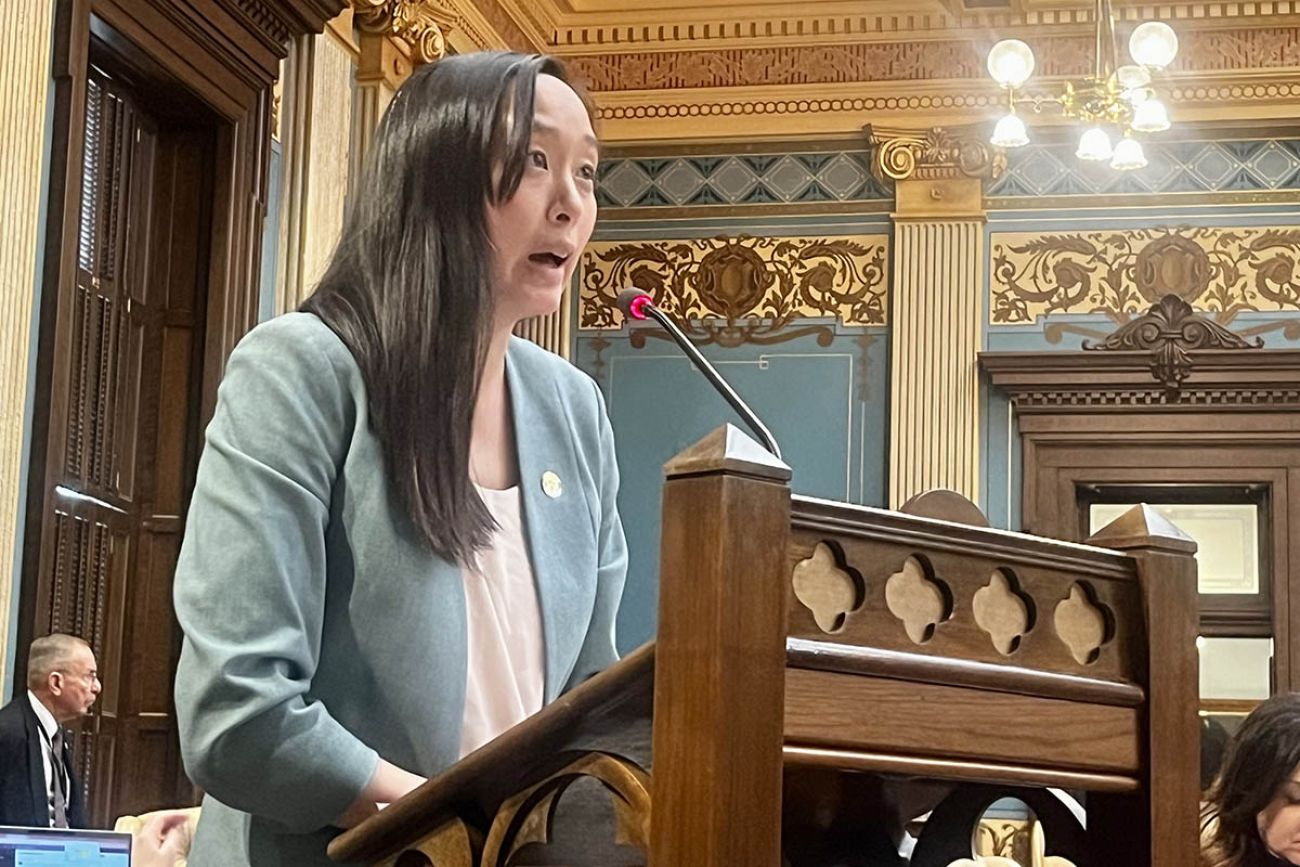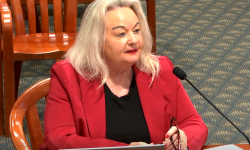Paid surrogate contracts may soon be legal in Michigan despite GOP concerns

- Michigan is poised to end criminal penalties for contracts between pregnancy surrogates and would-be parents
- Bills approved by Michigan Senate would establish clear parent-child relationships and outline the rights of surrogate mothers
- Gov. Gretchen Whitmer has already signaled her support for the effort and is expected to sign the bills into law
LANSING — Michigan is poised to eliminate criminal penalties for parents who sign paid surrogate pregnancy contracts under legislation approved Tuesday by the Democratic-led state Senate.
The bills – aimed at providing legal guardrails surrounding surrogacy contracts in a state which otherwise has few – now head to Gov. Gretchen Whitmer’s desk for her expected signature.
Michigan is the only state in the country that imposes criminal penalties for paid surrogate contracts, and some Republicans argued lifting those penalties could allow for physical and financial exploitation of lower-income women
Related:
- Michigan makes paid surrogate pregnancies a crime. That could change
- Michigan Democrats push to expand birth control access, boost supplies
- Whitmer to call for more family planning funds in budget proposal
But supporters championed Tuesday’s vote as a long overdue win for reproductive rights and would-be parents who can’t conceive on their own.
“These bills not only safeguard the rights of biological parents, but also prioritize the protection and the reproductive freedom of those surrogates,” Sen. Stephanie Chang, D-Detroit, said in a speech prior to the vote.

She hailed the bills as removing barriers to access for surrogacy by doing away with things like mandatory fingerprinting and background checks “in order to adopt the baby that was always intended to be theirs.”
The eight-bill package, already approved by the state House, amends current law to establish the Assisted Reproduction and Surrogacy Parentage Act. The main bill passed the Senate in a 22-15 vote.
The legislation would broadly protect parents of children conceived through other nontraditional methods, including in vitro fertilization. Among other things, the plan specifies that a sperm donor — whether paid or unpaid — is "not a parent of a child conceived by assisted reproduction."
But the package primarily aims to establish clear parent-child relationships under surrogate agreements, including what to do in the death of an intended parent, while outlining the rights of a surrogate mother in the process.
The plan would eliminate criminal penalties for surrogate contracts in Michigan. Currently, signing one is a misdemeanor punishable by up to 1 year in prison and a $10,000 fine. Arranging such a contract is a felony punishable by up to five years in prison and a fine of up to $50,000.
To qualify as a surrogate and carry a child for another family under the new legislation, a woman would have to be at least 21-years-old, given birth at least once before and pass a battery of physical and psychological tests.
Several Republicans took issue with the package. Sen. John Damoose of Harbor Springs argued the legislation would open up women to “potential reproductive exploitation.”
Damoose called the intent of the package — helping families have children of their own — an “admirable pursuit” but suggested that “rarely are issues so straightforward.”
“States with permissive surrogacy laws often become a destination for wealthy individuals or couples – both from our country and abroad – who travel to purchase a surrogate,” Damoose said. “Imagine the indecency of this proposition, and the potential for further exploitation of the poor by childless rich people.”
Democrats fast-tracked the bills last month after the conservative Alabama Supreme Court temporarily barred in vitro fertilization in that state by declaring frozen embryos are children, triggering a national debate over alternative family planning.
Whitmer has praised the Michigan proposals as a series of "commonsense, long overdue changes to remove criminal prohibitions on surrogacy, protect families formed by IVF, and ensure LGBTQ+ parents are treated equally."
As lawmakers spoke to the package’s perceived merits and drawbacks, Tammy Myers watched it all from the Senate chamber balcony, hands shaking.
She came to Lansing Tuesday in a rush, unaware lawmakers had scheduled a vote on an issue that had all but dominated the last three years of her life.
A mother of three from Grand Rapids, Myers and husband Jordan gained national attention after being forced to adopt their own biological twins born from what’s known as an altruistic surrogacy. These are legal in Michigan, though come with their own risks, as the Myerses were quick to find out when their twins were delivered prematurely in 2021.
Tammy Myers has since advocated for legislative action, and hearing GOP lawmakers speak so strongly in opposition to something she’d spent so much time on, “shook me to my core a little bit,” she said Tuesday.
“I would love to have a conversation with any one of them and have them look me in the eye and explain why they so strongly oppose a bill that would have made my path, and so many other families’ path, easier, and would have allowed us to focus on the miracles that were happening,” she said.
Because her children’s birth certificates listed their surrogate family’s name, two Kent County judges ruled Myers and her husband were not their legal parents. As a result, they had no say in their children’s treatments in the neonatal intensive care unit after they were born, and no way to add them to their family’s insurance.
The legal fight could have been avoided if the surrogate and family had signed a contract, Myers acknowledged. But under current Michigan law, anyone who signs a paid surrogacy contract can be criminally charged.
The Myerses were able to bring home son Eames and daughter Ellison in 2022. The pair just celebrated their third birthdays, Myers told reporters Tuesday following the Senate vote.
“Knowing that this is now no longer going to be an obstacle for families like mine, I do believe that more families will grow because of it,” she said, “just because it’s more of a seamless process.”
See what new members are saying about why they donated to Bridge Michigan:
- “In order for this information to be accurate and unbiased it must be underwritten by its readers, not by special interests.” - Larry S.
- “Not many other media sources report on the topics Bridge does.” - Susan B.
- “Your journalism is outstanding and rare these days.” - Mark S.
If you want to ensure the future of nonpartisan, nonprofit Michigan journalism, please become a member today. You, too, will be asked why you donated and maybe we'll feature your quote next time!




